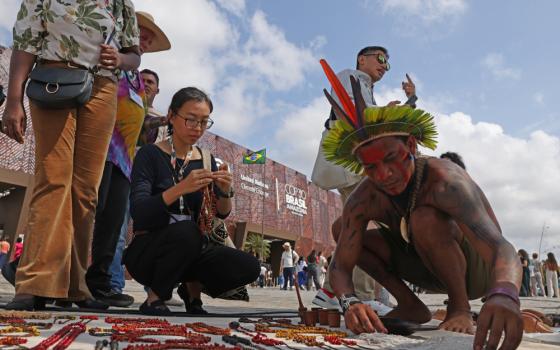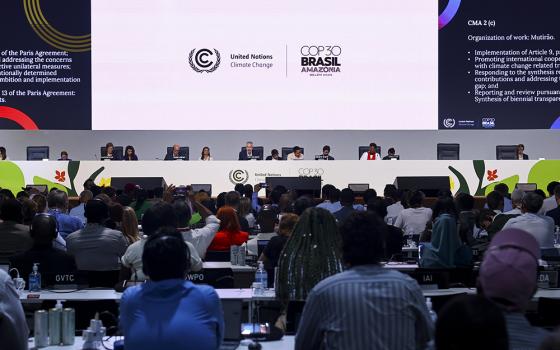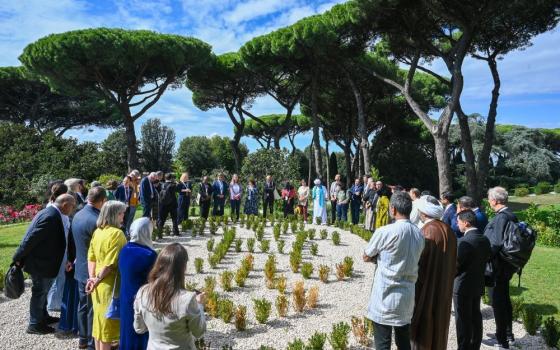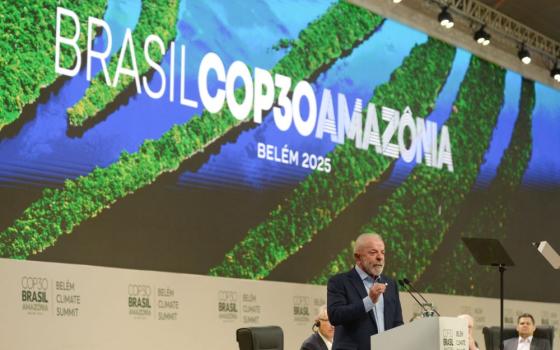
A drone view of the chimney of the Candiota III coal-fired power plant in Candiota, Brazil, May 9, 2025. A delegation of cardinals, bishops and lay activists gives the Brazil church a strong presence at the 30th United Nations climate change conference, or COP30, taking place Nov. 10-21 in Belém. (OSV News/Reuters/Diego Vara)
As world leaders gather in Belém, Brazil, for the COP30 climate summit, faith leaders and environmental advocates are sounding an alarm that governments continue to pour billions into fossil fuels even as climate disasters multiply and pledges for a greener future echo through the halls of negotiation.
For the first time, a United Nations climate conference is being held in the heart of the Amazon, the world's largest rainforest and one of its most vital carbon sinks. The setting is both symbolic and sobering. Forests are burning, temperatures are rising and the global response, religious leaders say, remains dangerously timid.
"There's a tragic, sinful gap between the call to care for creation and the failure of governments to act," said the Rev. Fletcher Harper, an Episcopal priest and executive director of GreenFaith.
"The real obstacle is the moral cowardice of the biggest polluters — the U.S., China, Russia, Germany, the U.K., Japan, India, France and Canada — whose leaders refuse to match their words with action," he added. "Behind them stand the fossil fuel giants that have known for decades their products were heating the planet and did it anyway. This is not just policy failure. It's an ethical breakdown."

Climate activists, including religious leaders, demonstrate at the COP29 U.N. climate summit held in Baku, Azerbaijan, on Nov. 16, 2024. Belém, Brazil, near the edge of the Amazon rainforest, plays host to the COP30 United Nations climate change conference Nov. 10-21, 2025. (NCR photo/Doreen Ajiambo)
The contradiction runs deep. Between 2020 and 2021, G20 countries committed at least $254 billion to oil and gas policies and another $79 billion to coal, even as they pledged to phase out fossil fuels under the Paris Agreement, according to Energy Policy Tracker.
The International Energy Agency reported in its World Energy Outlook 2023 that global fossil fuel consumption subsidies topped $1 trillion in 2023, a staggering amount of public money propping up the very industry driving the climate crisis.
To meet the Paris Agreement's temperature limits, the world would need to retire existing oil and gas infrastructure five times faster than it is doing now, according to Global Energy Monitor. Instead, governments continue to build more.
"There was a time when fossil fuels seemed like the cheapest path to economic growth," Harper said. "That excuse is history. Continued expansion isn't about economics, it's about corruption. The fossil fuel industry receives $7 trillion in subsidies each year — that's $13 million every minute."
Brazil's green promise with oil beneath
When President Luiz Inácio Lula da Silva pledged to make COP30 "the COP of truth" and eliminate deforestation by 2030, hopes ran high that Brazil would lead by example. But just weeks before the summit, Brazil's environmental agency approved state-run Petrobras to drill exploratory wells close to the mouth of the Amazon River — a region flagged for high environmental risk.

The Rev. Fletcher Harper, Episcopal priest and executive director of GreenFaith, poses for a photo at COP29 in Baku, Azerbaijan, on Nov. 16, 2024. (NCR photo/Doreen Ajiambo)
"It's understandable that Brazil seeks economic growth and opportunity for its people," said Harper. "But true development can't be built on what destroys the foundations of life. Expanding fossil fuel extraction may offer short-term revenue, but it deepens long-term suffering."
Fr. Iyo Iyan Daquin, coordinator of the Justice, Peace and Integrity of Creation ministry for the Oblate Mission in Kenya, said Brazil's dilemma mirrors a global pattern.
"This is the paradox of our time," he said. "Hosting a COP is a chance for leadership, but doing so while deepening extraction exposes the limits of courage. Contradiction can still become conversion — if it sparks a credible plan to phase down fossil production and protect ecosystems like the Amazon."
Brazil's predicament is only the latest chapter in a familiar story. Across the world, governments that promise climate leadership continue to invest in the very fuels driving the crisis.
In the United States, former President Joe Biden, who once called climate change an "existential threat," approved the Willow oil project in Alaska, a development expected to produce nearly 600 million barrels of oil over 30 years. Across the Atlantic, former British Prime Minister Rishi Sunak, who once reaffirmed Britain's commitment to reach net zero by 2050, also delayed key green policies and approved development of the Rosebank oil field — the country's largest untapped oil reserve in the North Sea.
China, meanwhile, leads the world in renewable energy investment, building more solar and wind capacity than the rest of the world combined. But even as it builds record numbers of wind and solar power installations, China also approved more than 11 gigawatts of new coal power in early 2025.
Advertisement
India faces a similar duality: it boasts one of the most ambitious clean energy targets on Earth, 500 gigawatts of non-fossil fuel energy by 2030, yet its oil use is projected to rise about 45% over the next decade, according to reports.
Canada, long praised for its carbon pricing policy, has completed the expansion of its Trans Mountain pipeline, tripling the flow of oil sands crude to the Pacific. And the United Arab Emirates, which hosted COP28 only two years ago, continues to expand its Abu Dhabi National Oil Company's production capacity even as it promotes a vision of "net zero" diplomacy.
"These contradictions are not just political inconsistencies," said Daquin. "They catechize the world in cynicism. Expanding fossil fuels while promising climate action signals that the poor are expendable and the planet is negotiable. True leadership aligns national interest with the global common good."
'The Amazon itself is the message'
For Daquin, COP30's location carries spiritual weight. "The Amazon itself is the message," he said. "It's not a warehouse of resources but a living sanctuary that regulates the planet's climate and water. Leaders cannot claim to protect the planet while allowing the death of its lungs."
That sentiment is echoed by Harper. "The Amazon is a miraculous emblem of divine creativity and grace," he said. "We hope it can move the hearts of world leaders — even in this age of disinformation and disregard for the rights of people and the planet."
Kirsten Sayers, CEO of Caritas Australia, said the setting underscores the moral urgency of the moment.
"After 30 years of climate negotiations, the legacy of COP is mixed," she said. "While the process has elevated awareness and built frameworks, the gap between promises and action remains stark, especially for communities on the frontlines."
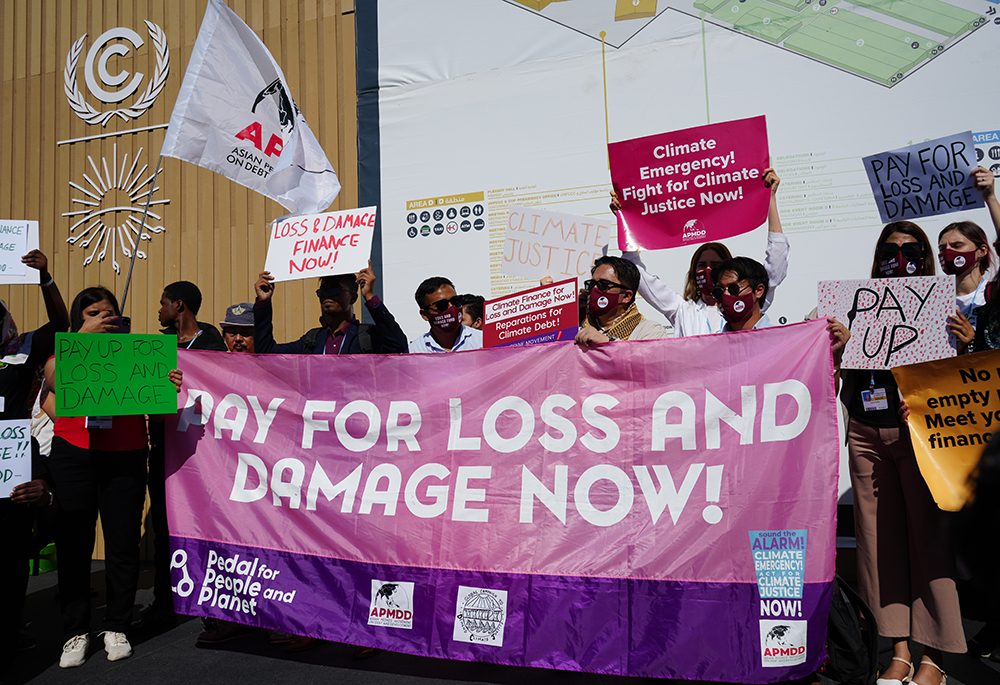
Climate activists, including faith leaders, demonstrate with banners during COP27, held Nov. 6-20, 2022, in Sharm El-Sheikh, Egypt. (NCR photo/Doreen Ajiambo)
Sayers said Caritas attends COP alongside partners from the Pacific and Africa to push for climate finance that is just, accessible and grant-based, reflecting what Catholic teaching calls ecological debt — the moral obligation of wealthy nations to support those suffering the worst effects of climate change.
"This Jubilee Year offers a profound opportunity to reframe the conversation," she said. "We must care for the world God created and for our brothers and sisters who bear the brunt of inaction. If COP30 ends without concrete steps, faith-based movements must continue to push for accountability. Our mission is not only to respond to suffering, but to challenge the systems that cause it."
Political promises vs. atmospheric deadlines
At the heart of the climate crisis lies an uncomfortable arithmetic: existing fossil fuel infrastructure alone would push the planet past the 1.5°C warming threshold. Every new project makes that task harder.
"It's not that leaders don't understand the science," Harper said. "It's that they don't want to bear the political cost of acting on it."
The war in Ukraine and volatile energy prices have led many governments to double down on fossil fuel production in the name of energy security. But faith leaders say what began as a short-term measure has hardened into long-term backsliding.
"Every nation faces economic pressure," said Daquin. "But true leadership is measured by what we refuse, not merely by what we announce. Moral consistency remains the first act of credibility."

A file photo shows smoke billowing from a fire in an area of the Amazon rainforest near Porto Velho, Brazil. (OSV News/Reuters/Bruno Kelly)
While delegates debate in air-conditioned halls, communities across Pará and the wider Amazon are living the crisis firsthand. Brazil has recorded its worst fire season in more than a decade, fueled by drought linked to El Niño. Farmers have lost homes and crops; volunteers have formed makeshift fire brigades armed with buckets and hope.
Sayers said these realities drive Caritas and other Catholic agencies to advocate for both justice and resilience. "Through our network, we see the human cost of climate inaction — children missing school, families displaced, livelihoods lost," she said. "This is a global failure of solidarity."
As banners proclaim urgency and unity around COP30's venue, the mood in Belém remains cautious. The Paris Agreement's global stocktake process is pushing countries to strengthen their targets, but faith leaders say trust is thin.
'It's not that leaders don't understand the science. It's that they don't want to bear the political cost of acting on it.'
—Rev. Fletcher Harper
"Politicians talk about timelines and targets," said Harper. "Faith communities talk about truth and responsibility. The longer leaders play this double game, the more the world burns."
For people across the Amazon and beyond, the climate crisis is not a future threat but a daily test of survival.
"The Amazon teaches that creation care is not philanthropy but justice," said Daquin. "Each cleared hectare is a parable of greed; each community defending life is a seed of global conversion."
For now, as COP30 delegates debate the future of the planet, faith leaders hope the summit becomes more than a forum for rhetoric.
"Hosting a COP means nothing if we keep drilling at the planet's heart," said Harper. "Faith calls us to choose life. The question is whether leaders have the courage to do the same."




